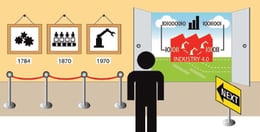What are NFTs & What does it Mean for Supply Chains?
Martin Pahulje - May 18, 2021

Blockchains and cryptocurrency are becoming increasingly popular hot topics this year. Revolutionizing how we process data online and transact money, individuals and businesses alike are jumping on the trend. For supply chain managers, it is crucial to be aware of developing technology in order to stay competitive and keep operations as efficient and up-to-date as possible. One concept, in particular, is creating a buzz across global industries, optimizing how data is handled and protected. Initially used for artistic purposes, NFTs, non-fungible tokens, have entered the business world. We will discuss exactly what an NFT is and how it could revolutionize supply chains.
What are NFTs?
NFTs are tokens with unique metadata that exist on a blockchain. Unable to be replicated or exchanged, these tokens are an extremely valuable form of cryptocurrency that holds ownership of an asset. Non-fungible digital assets have been in existence for a while and are still widely used today. Still, the recent inclusion of blockchain technology has added a new level of digital opportunity to this concept today. A non-blockchain, non-fungible asset lacks the power of  tokenization that is delivered by blockchain technology. The most significant difference between this and an NFT is the power to transfer the token in an open market. As a result, NFTs can be transferred and tracked on the blockchain without being mutually interchangeable. Blockchain also enables the verification of tokens, meaning there is an immutable authenticity that guarantees the authenticity of assets without requiring confirmation from a central figure. Overall, NFTs are defined by three factors; ownership, transferability, and authenticity. These attributes together create the perfect storm of digital innovation.
tokenization that is delivered by blockchain technology. The most significant difference between this and an NFT is the power to transfer the token in an open market. As a result, NFTs can be transferred and tracked on the blockchain without being mutually interchangeable. Blockchain also enables the verification of tokens, meaning there is an immutable authenticity that guarantees the authenticity of assets without requiring confirmation from a central figure. Overall, NFTs are defined by three factors; ownership, transferability, and authenticity. These attributes together create the perfect storm of digital innovation.
While most commonly, NFTs are used in ownership of art, music, and videos, they can be applied to any area – including supply chains. These tokens are so popular in the creative industry because they solve three problems currently faced by the creative industry. First, NFTs verify that an asset is an original work. For art and music, this ability is highly significant. Secondly, they verify the ownership of an original piece of work, another increasingly important attribute as the creative industry is rampant with duplicates. Finally, NFTs give creators a chance to profit off of their work. Clearly, these tokens are perfect for the creative industry, but that’s not the only area they are revolutionizing. Recently, they have broken into the supply chain industry.
Benefits
There are countless benefits to utilizing NFTs in any industry. NFTs enable the creation of rare and unique assets that cannot be destroyed, replicated, or forget, ensuring authenticity and quality of data at all times. This is significant for any organization taking pride in the uniqueness and constitution of its products. Additionally, because NFTs can be tracked on the blockchain, there is an immutable history of the assets, further ensuring their authenticity and origin. As stated, NFTs cannot be destroyed, and they do not deteriorate over time. Not only does this prove them to be a financially sound investment, but it also means that when used in applications, they will not deteriorate as a physical counterpart would. At the same time, they can be sold and exchanged back into Fiat if they are no longer needed. This means that while NFTs will not reach the end of their lifetime, you are not locked into using them for the lifecycle of your organization. But if you choose to keep your NFTs in your possession, you will have full ownership of the token. The user possessing the NFT has complete control of it at all times.
Furthermore, the trading platform that NFTs are transferred in are peer-to-peer, held in a secure trading platform enabling by blockchain technology. This limits the risk of possible fraudulent trading and verifies the legitimacy of all users. It is vital to be in a secure environment, and NFT has that covered for conducting business of any kind.
Supply Chain Application
While initially utilized in gaming and collectibles, NFTs are progressively becoming implemented in other industries. Thanks to recent developments, NFTs have joined the revolution of blockchain technology in innovating supply chain management. Their primary function in the supply chain is individually authenticating goods, ensuring their quality and origin. Not only does the token authenticate goods, but it also serves to remove counterfeits, secure traceability in products along the supply chain, and ensure uniqueness and maintain provenance.
While NFTs are booming in popularity in supply chains this year, their first proven stake in supply chains occurred a few years ago. Luxury fashion brand, Louis Vuitton, unveiled plans in 2019 to launch a blockchain platform that would use non-fungible tokens to authenticate the origin of high-priced goods. This would verify the quality and source of their products through tracking materials in the supply chain from start to finish. The tokens were used to identify and trace the  entire supply chain journey of every product, proving to customers of their uniqueness and quality. This is a significant tool for any organization with high-end products or a reputation to preserve. Verifying the quality of your products will instill confidence in your customers that you care about what you make. Furthermore, this is a tremendous advantage in maintaining compliance and working sustainably. In tracking and authenticating materials, you can be confident that you are delivering what you promise. As many organizations are looking to transition into the use of recycled and sustainable materials, the use of NFTs will guarantee that materials are as such.
entire supply chain journey of every product, proving to customers of their uniqueness and quality. This is a significant tool for any organization with high-end products or a reputation to preserve. Verifying the quality of your products will instill confidence in your customers that you care about what you make. Furthermore, this is a tremendous advantage in maintaining compliance and working sustainably. In tracking and authenticating materials, you can be confident that you are delivering what you promise. As many organizations are looking to transition into the use of recycled and sustainable materials, the use of NFTs will guarantee that materials are as such.
The same benefits translate into other supply chain-based businesses, such as the transportation industry. The average vehicle has around 30,000 individual parts. Whether manufactured in-house or sourced from a third-party provider, NFTs will provide you with enhanced insights into each material and component used in a given end-product. By assigning real-world materials to digital forms such as tokens, you can track their digital identity. In every step of the supply chain, you will have access to every material used, from their current location to their origin. This can also be applied to understanding manufacturing costs. Blockchain solutions such as NFTs provide transparency in transportation-related expenses and how they may correlate. With these insights, NFTs will enable more granular cost controls. There is no question of the vitality of transparency in the supply chain. NFTs provide this without the need for complex user access systems, increasing your supply chain's visibility without increasing complexity.
Whether you have already implemented blockchain into your supply chain or you have plans to, the use of NFT adds an additional edge to the potential of technology. Uniqueness and provenance are significant competitive advantages to organizations; NFTs will offer that and so much more. Digitizing your supply chain is key to keeping up with the ever-increasing pace of Industry 4.0. While you may have already implemented largely beneficial technologies, innovation never stops – and neither can you. Integrating blockchain technology such as NFTs will provide your organization with a significant competitive advantage – authenticity like never before.
Download our guide to Industry 4.O below:
LATEST POSTS
- Understand Circular Economy in The Manufacturing Industry
- How Can Industry 4.0 IT Integration Be Achieved Smoothly?
- The Significance of Order Sequencing in Discrete Manufacturing
- How to improve your Supply Chain Management: The Power of Control Towers
- Optimizing Human Resource Scheduling in Manufacturing: A Technological Approach



